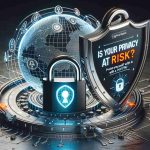
Is Your Privacy at Risk? Protect Yourself with a VPN!
The Importance of a VPN for Home Internet Users
In today’s digital age, the need for online privacy has never been more crucial. Enter the **virtual private network (VPN)**, a sophisticated tool designed to enhance your online security. By encrypting your internet traffic and rerouting it through a remote server, a VPN ensures that your real location remains hidden.
When you connect to the internet through a VPN, your device’s IP address is masked, making it appear as though you’re browsing from the VPN’s location. This additional layer of anonymity can provide several benefits.
**Enhanced Security:** By using a VPN, the data shared over the internet, especially on communication apps, is encrypted. This protects your conversations from prying eyes, ensuring that your online communications remain private.
**Access Global Content:** VPNs can help bypass geographic restrictions imposed by various online platforms, granting you access to content that might otherwise be unavailable based on your location.
**Stop Bandwidth Throttling:** Internet service providers may slow down your connection depending on your online activities. With a VPN, your ISP cannot monitor your usage patterns, thus preventing unwanted throttling.
**Defensive Barrier Against Cyberattacks:** VPNs provide robust protection, especially in unsecured networks. By encrypting your data, they make it much more challenging for hackers to intercept your information.
In a world where online privacy is increasingly at risk, incorporating a VPN into your home internet setup is a wise choice for security and peace of mind.
Unlocking Digital Security: Why You Should Consider a VPN Today
In an era where digital privacy is under siege, employing a **Virtual Private Network (VPN)** has become an essential strategy for home internet users. A VPN not only safeguards your online security but also enhances your browsing experience by offering a multitude of additional features that may benefit you.
### Key Features of VPNs
1. **Privacy Protection**: One of the primary benefits of a VPN is its ability to encrypt your web traffic and hide your IP address. This makes it exceedingly difficult for third parties, such as advertisers and cybercriminals, to track your online activities.
2. **Access to Restricted Content**: By connecting to a VPN server in another country, you can access websites and streaming services that may be geographically restricted in your own region. Whether it’s international movies, sports events, or social media content, a VPN can expand your digital horizons.
3. **Improved Online Performance**: Many users report enhanced speed and reduced lag when using a VPN, particularly when downloading large files or streaming video. This can be attributed to avoiding bandwidth throttling imposed by ISPs.
4. **Protection on Public Wi-Fi**: Utilizing public Wi-Fi can expose you to cyber threats. A VPN adds an important layer of security, encrypting your data and keeping your personal information safe from potential hackers on the same network.
5. **Avoiding Targeted Ads**: By masking your IP address and encrypting your connection, a VPN defends against unwanted targeted advertisements based on your browsing habits.
### Pros and Cons of Using a VPN
**Pros:**
– Increased online privacy and anonymity
– Access to geo-restricted content and services
– Enhanced security on public networks
– Protection from ISP bandwidth throttling
– Defense against cyberattacks and data leaks
**Cons:**
– Potential decrease in internet speed due to encryption overhead
– Subscription costs for high-quality VPN services
– Some platforms may detect and restrict VPN usage
– Incomplete anonymity if sensitive data is shared while online
### Security and Privacy Innovations
With the rise of cyber threats, VPN technology has evolved. Some companies are now offering features like:
– **Multi-hop connections**: Routing your connection through multiple VPN servers for an extra layer of security.
– **Kill switch functionality**: Automatically disconnecting your internet access if the VPN connection drops, preventing any data leakage.
– **Split tunneling**: Allowing users to choose which apps will connect to the VPN and which will use a direct connection for optimized performance.
### Sustainability and Ethical Use
Using a VPN can also align with sustainable digital practices, as it enables users to engage in geo-unblocking for more diverse streaming choices without contributing to the carbon footprint of multiple streaming services. Choosing eco-friendly VPN providers that commit to sustainable practices can enhance the ethical considerations of using a VPN.
### Market Analysis and Trends
The VPN market continues to grow, fueled by increasing awareness of online privacy and security. It’s predicted that by 2025, the VPN industry will see significant expansions in user adoption rates, largely due to the escalating number of cyberattacks and privacy breaches.
### Conclusion
Integrating a VPN into your home internet usage is not just about online privacy; it’s also a proactive measure against various digital threats while enhancing your overall internet experience. With continued innovation and increasing user demands, VPNs are poised to remain a key component of modern internet security tools. For further insights on setting up a VPN and exploring reputable providers, visit VPN Information.















